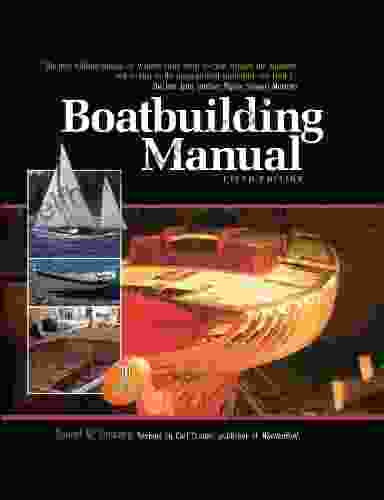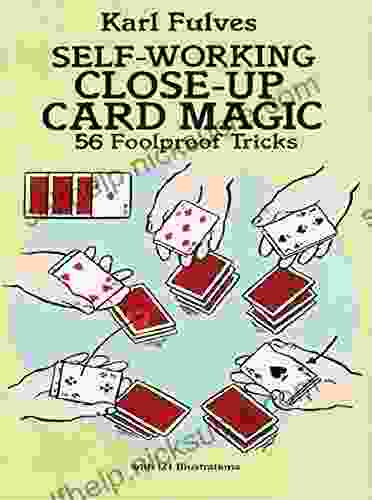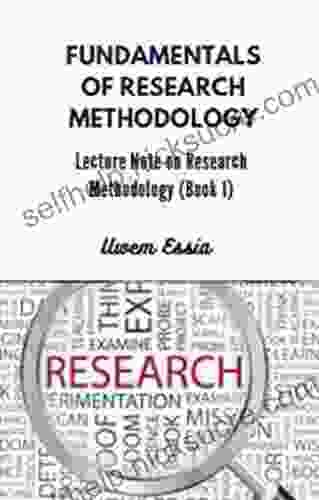Fundamentals Of Research Methodology: A Comprehensive Lecture Note

Research methodology is the systematic and scientific approach to the study of a topic. It involves the collection, analysis, and interpretation of data in order to answer questions and make informed decisions. A well-structured research methodology ensures that the research is conducted in a rigorous and unbiased manner, and that the results are valid and reliable.
This lecture note will provide an overview of the fundamentals of research methodology, including the different types of research, the research process, and the methods of data collection and analysis.
There are two main types of research: qualitative and quantitative.
4.5 out of 5
| Language | : | English |
| File size | : | 1289 KB |
| Text-to-Speech | : | Enabled |
| Screen Reader | : | Supported |
| Enhanced typesetting | : | Enabled |
| Word Wise | : | Enabled |
| Print length | : | 50 pages |
| Lending | : | Enabled |
- Qualitative research involves the collection and analysis of non-numerical data, such as interviews, observations, and documents. This type of research is often used to explore a topic in depth and to gain an understanding of the experiences and perspectives of the participants.
- Quantitative research involves the collection and analysis of numerical data, such as surveys, experiments, and polls. This type of research is often used to measure the relationships between variables and to test hypotheses.
The research process typically involves the following steps:
- Define the research question. The research question is the specific question that the research will seek to answer. It should be clear, concise, and feasible.
- Review the literature. A review of the literature is conducted to identify what is already known about the research topic. This helps to avoid duplication of effort and to build on the work of others.
- Develop a research design. The research design is a plan for how the research will be conducted. It includes the methods of data collection and analysis, as well as the timeline for the research.
- Collect data. Data is collected using a variety of methods, such as surveys, experiments, and interviews. The data should be collected in a systematic and unbiased manner.
- Analyze data. The data is analyzed to identify patterns and trends. Statistical analysis may be used to test hypotheses and to draw s.
- Interpret results. The results of the research are interpreted in light of the research question and the literature review. The interpretation should be based on the evidence and should avoid bias.
- Disseminate findings. The findings of the research are disseminated to the public through a variety of channels, such as publications, presentations, and conferences.
There are a variety of methods for collecting data, including:
- Surveys are questionnaires that are used to collect information from a group of people.
- Experiments are controlled studies that are used to test hypotheses.
- Interviews are face-to-face or telephone conversations that are used to collect information from individuals.
- Observations are used to collect data about behavior or other phenomena.
- Documents are written or recorded sources of information that can be used to collect data.
There are a variety of methods for analyzing data, including:
- Descriptive statistics are used to summarize data and to identify patterns and trends.
- Inferential statistics are used to test hypotheses and to make generalizations about a population.
- Qualitative analysis is used to analyze non-numerical data, such as interviews and observations.
- Mixed methods research combines both quantitative and qualitative methods to collect and analyze data.
Research methodology is a systematic and scientific approach to the study of a topic. It involves the collection, analysis, and interpretation of data in order to answer questions and make informed decisions. A well-structured research methodology ensures that the research is conducted in a rigorous and unbiased manner, and that the results are valid and reliable.
4.5 out of 5
| Language | : | English |
| File size | : | 1289 KB |
| Text-to-Speech | : | Enabled |
| Screen Reader | : | Supported |
| Enhanced typesetting | : | Enabled |
| Word Wise | : | Enabled |
| Print length | : | 50 pages |
| Lending | : | Enabled |
Do you want to contribute by writing guest posts on this blog?
Please contact us and send us a resume of previous articles that you have written.
 Fiction
Fiction Non Fiction
Non Fiction Romance
Romance Mystery
Mystery Thriller
Thriller SciFi
SciFi Fantasy
Fantasy Horror
Horror Biography
Biography Selfhelp
Selfhelp Business
Business History
History Classics
Classics Poetry
Poetry Childrens
Childrens Young Adult
Young Adult Educational
Educational Cooking
Cooking Travel
Travel Lifestyle
Lifestyle Spirituality
Spirituality Health
Health Fitness
Fitness Technology
Technology Science
Science Arts
Arts Crafts
Crafts DIY
DIY Gardening
Gardening Petcare
Petcare Katie Cotugno
Katie Cotugno Bubba Watson
Bubba Watson Shelly Rainforth Collins
Shelly Rainforth Collins Deborah Falaye
Deborah Falaye Tim Muehlhoff
Tim Muehlhoff Hillary Davis
Hillary Davis William Schoolcraft
William Schoolcraft Atlas Kane
Atlas Kane Fred Provenza
Fred Provenza Bill Thorness
Bill Thorness Matt Forbeck
Matt Forbeck Florin Grancea
Florin Grancea James Feess
James Feess Moon Travel Guides
Moon Travel Guides Harry Bauld
Harry Bauld Sara Zarr
Sara Zarr Ken Phillips
Ken Phillips John Gray
John Gray Patrick Hamill
Patrick Hamill Bob Smale
Bob Smale Rachel Mitchell
Rachel Mitchell Blake Dresden
Blake Dresden Tara Dixon Engel
Tara Dixon Engel Patrick Holford
Patrick Holford Brooke Dojny
Brooke Dojny Audrey Sutherland
Audrey Sutherland Ashley Rhodes Courter
Ashley Rhodes Courter Ayn Rand
Ayn Rand Jessica Seinfeld
Jessica Seinfeld Austa Somvichian Clausen
Austa Somvichian Clausen Bernd Brunner
Bernd Brunner Geoffrey Budworth
Geoffrey Budworth Karen Whitley Bell
Karen Whitley Bell Tracy Deonn
Tracy Deonn Sonia Mainstone Cotton
Sonia Mainstone Cotton Brian A Hall
Brian A Hall Siddhartha Mukherjee
Siddhartha Mukherjee Ed Jaworowski
Ed Jaworowski Nsca National Strength Conditioning Association
Nsca National Strength Conditioning Association Aubre Andrus
Aubre Andrus Larry Dane Brimner
Larry Dane Brimner Roger Lajoie
Roger Lajoie Uta C Merzbach
Uta C Merzbach Gareth Loy
Gareth Loy Mami Wata
Mami Wata Penny Simkin
Penny Simkin Jayme Adelson Goldstein
Jayme Adelson Goldstein Sanya Richards Ross
Sanya Richards Ross Arthur Benjamin
Arthur Benjamin Karl Fulves
Karl Fulves Nick Fragel
Nick Fragel William Woys Weaver
William Woys Weaver J C Pater
J C Pater Jerome D Smalls
Jerome D Smalls Joanne Simon Walters
Joanne Simon Walters Alan Vermilye
Alan Vermilye Gerald Paul Clifford
Gerald Paul Clifford Nancy Owens Barnes
Nancy Owens Barnes Martin Liebscher
Martin Liebscher Patricia Stacey
Patricia Stacey Don J Sharpsteen
Don J Sharpsteen Simon Askey
Simon Askey Kevin Kelly
Kevin Kelly Babatunde Peter
Babatunde Peter Collins Dictionaries
Collins Dictionaries Dk
Dk Shepherd Mead
Shepherd Mead Jim Fay
Jim Fay Nathan Clark
Nathan Clark Susan M Sheridan
Susan M Sheridan Esther M Toddler
Esther M Toddler Vivian Sandau
Vivian Sandau Rudy Sanchez
Rudy Sanchez Dean Karnazes
Dean Karnazes Richard H Immerman
Richard H Immerman Larry Gonick
Larry Gonick Audrey Grey
Audrey Grey Darren Palmer
Darren Palmer Jacqui Letran
Jacqui Letran Maureen Connolly
Maureen Connolly John Hiker
John Hiker Carly Gelsinger
Carly Gelsinger Steve Bisheff
Steve Bisheff Philip Clayton
Philip Clayton Richard Ferber
Richard Ferber Luca Caioli
Luca Caioli Gary Webster
Gary Webster Jesus Salcedo
Jesus Salcedo Paul Pilkington
Paul Pilkington Jessica Nabongo
Jessica Nabongo Kenneth P Miller
Kenneth P Miller Tarik Unal
Tarik Unal Izabelle Winter
Izabelle Winter Lizzie Lane
Lizzie Lane Yang Jwing Ming
Yang Jwing Ming Kevin Bales
Kevin Bales Casey Barber
Casey Barber Vance Packard
Vance Packard Robert Simons
Robert Simons Mohamed F El Hewie
Mohamed F El Hewie Todd Mikkelsen
Todd Mikkelsen Sam Pathy
Sam Pathy Huw Price
Huw Price Conrad Goeringer
Conrad Goeringer Michael Paul
Michael Paul Belinda Smith Sullivan
Belinda Smith Sullivan Tony Nester
Tony Nester Reinhard Bonnke
Reinhard Bonnke E W Bullinger
E W Bullinger Linda Wong
Linda Wong William M Kelso
William M Kelso Autumn Carpenter
Autumn Carpenter Cat Coluccio
Cat Coluccio Gaby Melian
Gaby Melian Drew Harris
Drew Harris Renzo Gracie
Renzo Gracie Christine Ann Lawson
Christine Ann Lawson Dima Zales
Dima Zales Dory Willer
Dory Willer Beatrice Bruteau
Beatrice Bruteau Marie Rutkoski
Marie Rutkoski Leonard Mlodinow
Leonard Mlodinow Cynthia Hand
Cynthia Hand Peter Levin
Peter Levin Dr Jerisa Berry
Dr Jerisa Berry Larry Hart
Larry Hart Ryan Sleeper
Ryan Sleeper Richard Strozzi Heckler
Richard Strozzi Heckler Graham Frankel
Graham Frankel Hugh Acheson
Hugh Acheson David J Miklowitz
David J Miklowitz Robert E Howard
Robert E Howard Richard Boergers
Richard Boergers Smadar Lavie
Smadar Lavie Kathy Pike
Kathy Pike Dustin Hansen
Dustin Hansen Sofia Price
Sofia Price Richard Miles
Richard Miles Beverly Conyers
Beverly Conyers Timo Holmquist
Timo Holmquist Ellyn Sanna
Ellyn Sanna The Car Crash Detective
The Car Crash Detective Matt Wallaert
Matt Wallaert Emenwa Global
Emenwa Global Joe Kelsey
Joe Kelsey Katie Hoff
Katie Hoff Harlan Coben
Harlan Coben Jeffrey Freed
Jeffrey Freed Blake Boles
Blake Boles Jermaine Marshall
Jermaine Marshall Spanked Teen
Spanked Teen Maria Montessori
Maria Montessori Jeff Vandermeer
Jeff Vandermeer Mike Doyle
Mike Doyle David Landis
David Landis Elizabeth M Ward
Elizabeth M Ward Mark Coeckelbergh
Mark Coeckelbergh Sharon Slater
Sharon Slater Michael Grimm
Michael Grimm Dougald Macdonald
Dougald Macdonald Avinash K Dixit
Avinash K Dixit Andy Mcilree
Andy Mcilree Marc Kery
Marc Kery John Sharp
John Sharp Leonard Susskind
Leonard Susskind Loren W Christensen
Loren W Christensen Johny Pitts
Johny Pitts Janet Gurtler
Janet Gurtler Efrain Galeano
Efrain Galeano Robert Warden
Robert Warden Duncan J Watts
Duncan J Watts Rajeev Lal
Rajeev Lal Kathleen M Eisenhardt
Kathleen M Eisenhardt Marc D Lewis
Marc D Lewis Lisa Fain
Lisa Fain Vicki Hoefle
Vicki Hoefle Joe Friel
Joe Friel Johnette Howard
Johnette Howard Terasa Cooley
Terasa Cooley Deborah Miller
Deborah Miller B F Skinner
B F Skinner Quick Reads
Quick Reads Robert M Bramson
Robert M Bramson James Nestor
James Nestor Cora Seton
Cora Seton Fred Alan Wolf
Fred Alan Wolf Rehan Haider
Rehan Haider Joe Baird
Joe Baird S Ali Myers
S Ali Myers Gabriel Gambetta
Gabriel Gambetta Ethan Sawyer
Ethan Sawyer Tracey L Moore
Tracey L Moore Eitan Bar
Eitan Bar Peter Bronski
Peter Bronski Antoni Porowski
Antoni Porowski Dan Blanchard
Dan Blanchard David Dalglish
David Dalglish Robert T Clemen
Robert T Clemen Martin Rees
Martin Rees Gabrielle Bossis
Gabrielle Bossis Don Casey
Don Casey Conor Sullivan
Conor Sullivan Barbara Oakley Phd
Barbara Oakley Phd Thane K Pratt
Thane K Pratt Jennifer Love
Jennifer Love Christopher Burris
Christopher Burris Kira Breed Wrisley
Kira Breed Wrisley Asiphile Qulu
Asiphile Qulu Print Replica Kindle Edition
Print Replica Kindle Edition Laura A Roser
Laura A Roser Jonothan Page
Jonothan Page Gemma Mccrae
Gemma Mccrae Kay Wills Wyma
Kay Wills Wyma Vasily Mahanenko
Vasily Mahanenko Kathy Hirsh Pasek
Kathy Hirsh Pasek Paul Tukey
Paul Tukey Jeff Szuhay
Jeff Szuhay Athena P Kourtis
Athena P Kourtis Mercedes Lackey
Mercedes Lackey Jeannie Burlowski
Jeannie Burlowski Tomasz Witkowski
Tomasz Witkowski Miriam Manela
Miriam Manela Maya Angelou
Maya Angelou Mary Jayne Baker
Mary Jayne Baker David Shoalts
David Shoalts George Orwell
George Orwell Morgan Murphy
Morgan Murphy Lori Foster
Lori Foster Kindle Edition
Kindle Edition Catherine Belknap
Catherine Belknap Randi Kreger
Randi Kreger John Swinton
John Swinton Shelley Johnson
Shelley Johnson Cece Winans
Cece Winans Fennel Hudson
Fennel Hudson Samir Okasha
Samir Okasha Lucy Hopping
Lucy Hopping Daffodil Campbell
Daffodil Campbell Carl Safina
Carl Safina David Acheson
David Acheson Steven Rinella
Steven Rinella Ken Fry
Ken Fry John Connor
John Connor M Prefontaine
M Prefontaine Deborah J Rumsey
Deborah J Rumsey Brent Dykes
Brent Dykes Nfhs
Nfhs Scott Turansky
Scott Turansky John Littleford
John Littleford Chris Santella
Chris Santella Patty Hahne
Patty Hahne Bob Weeks
Bob Weeks Sharon Baranoski
Sharon Baranoski Lindsey Philpott
Lindsey Philpott Hilary Scarlett
Hilary Scarlett Chris Burkard
Chris Burkard Manly P Hall
Manly P Hall Kimberly Willis
Kimberly Willis J A Baker
J A Baker Patrisia Gonzales
Patrisia Gonzales Stephen Morris
Stephen Morris Laura Riley
Laura Riley Nic Stone
Nic Stone John Gierach
John Gierach E Paul Zehr
E Paul Zehr Avery Faigenbaum
Avery Faigenbaum Cornelia Pelzer Elwood
Cornelia Pelzer Elwood Mark Parman
Mark Parman James Ladyman
James Ladyman Prayer M Madueke
Prayer M Madueke John Austin
John Austin Barbara Blitzer
Barbara Blitzer Lew Freedman
Lew Freedman Claire Nance
Claire Nance Yogi Ramacharaka
Yogi Ramacharaka Picabo Street
Picabo Street Mike Mastracci
Mike Mastracci Gary D Wale
Gary D Wale Dusty Phillips
Dusty Phillips Bernie Chowdhury
Bernie Chowdhury Susan F Paterno
Susan F Paterno George J Hademenos
George J Hademenos Augustine Wetta
Augustine Wetta Mike Eruzione
Mike Eruzione Janis B Meredith
Janis B Meredith Carol Ann Rinzler
Carol Ann Rinzler Pat Mora
Pat Mora Pedro G Ferreira
Pedro G Ferreira Kathy Jackson
Kathy Jackson Tiffany Wasson
Tiffany Wasson Paul Parsons
Paul Parsons Gillian Bradshaw
Gillian Bradshaw Laurie Katz
Laurie Katz Tara Sim
Tara Sim Seth Kantner
Seth Kantner Family Traditions Publishing
Family Traditions Publishing Simon Pridmore
Simon Pridmore Jens Voigt
Jens Voigt Tori Bortman
Tori Bortman Nina W Brown
Nina W Brown Leslie T Chang
Leslie T Chang Madelynne Diness Sheehan
Madelynne Diness Sheehan John Updike
John Updike Lara Lillibridge
Lara Lillibridge Dk Eyewitness
Dk Eyewitness Gail M Nelson
Gail M Nelson Ben Riggs
Ben Riggs Leigh Pearson
Leigh Pearson Brandon Sneed
Brandon Sneed Beverly Bell
Beverly Bell Brent Runyon
Brent Runyon Karen Skerrett
Karen Skerrett Sarah Boslaugh
Sarah Boslaugh Carol Potter
Carol Potter Barry Cunliffe
Barry Cunliffe Peter Gieler
Peter Gieler David Code
David Code Stewart M Green
Stewart M Green Kaleb Dahlgren
Kaleb Dahlgren Wilfrid Jonson
Wilfrid Jonson Qukids
Qukids Sarah B Bush
Sarah B Bush Kay Harris Kriegsman
Kay Harris Kriegsman Keith Mcnulty
Keith Mcnulty Ken Denmead
Ken Denmead Bradley Stone
Bradley Stone Catherine Rodgers
Catherine Rodgers Brian Christian
Brian Christian R F Egerton
R F Egerton Vb Leghorn
Vb Leghorn Joe Hutto
Joe Hutto James Garbarino
James Garbarino Linda Fairley
Linda Fairley James Ori
James Ori Mandy Khoshnevisan
Mandy Khoshnevisan Paul Oliver
Paul Oliver Robert Chuckrow
Robert Chuckrow Ethan Gallogly
Ethan Gallogly John Quick
John Quick Augustus M Walton
Augustus M Walton Steven Brill
Steven Brill Tom Humphries
Tom Humphries Colleen Hoover
Colleen Hoover Alan Lightman
Alan Lightman Liz Carmack
Liz Carmack Patricia L Thompson
Patricia L Thompson Rufus Stephens
Rufus Stephens Justine Kerfoot
Justine Kerfoot Martins Zaumanis
Martins Zaumanis John Skinner
John Skinner Roy Benaroch Md
Roy Benaroch Md Ori Hofmekler
Ori Hofmekler Greta Eskridge
Greta Eskridge Gabriela Rosa
Gabriela Rosa Asia Citro
Asia Citro Mark Gardener
Mark Gardener Daria Blackwell
Daria Blackwell Stan Fischler
Stan Fischler Edward Lee
Edward Lee Zhi Gang Sha
Zhi Gang Sha Robert M Steward
Robert M Steward Lisa Gache
Lisa Gache Lawrence A Kane
Lawrence A Kane Julia Albu
Julia Albu Deborah T Goldberg
Deborah T Goldberg Larry Miller
Larry Miller T J Emerson
T J Emerson Steve Colgate
Steve Colgate Charles D Garvin
Charles D Garvin Dan Morse
Dan Morse E Randolph Richards
E Randolph Richards Mark Baker
Mark Baker Steve Oakes
Steve Oakes M D William W Forgey
M D William W Forgey Staff Of The Harvard Crimson
Staff Of The Harvard Crimson Scott Mactavish
Scott Mactavish Sandy Hall
Sandy Hall Kilian Jornet
Kilian Jornet Greg B Smith
Greg B Smith Hourly History
Hourly History Audre Lorde
Audre Lorde Casey Schreiner
Casey Schreiner Lyn Millner
Lyn Millner Tom Rea
Tom Rea Deanna Pecaski Mclennan
Deanna Pecaski Mclennan Mia Baxter
Mia Baxter T Berry Brazelton
T Berry Brazelton Ernestine Gilbreth Carey
Ernestine Gilbreth Carey Eric Jones
Eric Jones Jessica Nordell
Jessica Nordell Tony Clunn
Tony Clunn John D Mccann
John D Mccann Karen Berger
Karen Berger Lise Eliot
Lise Eliot Bruno Barnhart
Bruno Barnhart Ervin Laszlo
Ervin Laszlo Austin Ruse
Austin Ruse Linda West
Linda West Samantha Bongeka Nqoko
Samantha Bongeka Nqoko Steven M Bragg
Steven M Bragg Deanna Roy
Deanna Roy Aylette Jenness
Aylette Jenness Heather Heying
Heather Heying Colin Towell
Colin Towell Lois Lowry
Lois Lowry Ayesha Ratnayake
Ayesha Ratnayake James Deetz
James Deetz Timothy J Jorgensen
Timothy J Jorgensen Charles L Thompson
Charles L Thompson Joe Ryder
Joe Ryder Eric S Raymond
Eric S Raymond Jim Collins
Jim Collins Mike Kim
Mike Kim N West Moss
N West Moss Linda Dobson
Linda Dobson Fred Mitchell
Fred Mitchell Aspen Matis
Aspen Matis Carolyn Wyman
Carolyn Wyman Paul Bodine
Paul Bodine Levison Wood
Levison Wood Miriam Erick
Miriam Erick Temple Bailey
Temple Bailey Nita Sweeney
Nita Sweeney Kristin Fontichiaro
Kristin Fontichiaro Dana Wechsler Linden
Dana Wechsler Linden Brett Ortler
Brett Ortler Audrey Coulthurst
Audrey Coulthurst G R S Mead
G R S Mead Darja Wagner Ph D
Darja Wagner Ph D Warren W Wiersbe
Warren W Wiersbe Sadie Keller
Sadie Keller Larry Olmsted
Larry Olmsted Stephanie Donaldson Pressman
Stephanie Donaldson Pressman Pete Whittaker
Pete Whittaker Lilith Dorsey
Lilith Dorsey Lamis Chebbi
Lamis Chebbi Ron Dalby
Ron Dalby Emily Whaley
Emily Whaley Danny Staple
Danny Staple Jessica S Olson
Jessica S Olson Rena Ejiogu
Rena Ejiogu Brigid Kemmerer
Brigid Kemmerer Heather E Schwartz
Heather E Schwartz Clive Finlayson
Clive Finlayson Denny Emerson
Denny Emerson Greg Lavern
Greg Lavern Adam Parkinson
Adam Parkinson Robert W Sullivan Iv
Robert W Sullivan Iv Kjell Erik Rudestam
Kjell Erik Rudestam Chloe Lukasiak
Chloe Lukasiak C M Gray
C M Gray Judith Z Kallenbach
Judith Z Kallenbach Lore M Dickey
Lore M Dickey Jim Holt
Jim Holt Spike Walker
Spike Walker Debora Rasio
Debora Rasio R Scott Thornton
R Scott Thornton Eunice Pennington
Eunice Pennington Babu The Panda
Babu The Panda Rick Burgess
Rick Burgess Jonathan Cane
Jonathan Cane Suzanne Jurmain
Suzanne Jurmain Conrad Anker
Conrad Anker John S Ahlquist
John S Ahlquist Foster Provost
Foster Provost Peggy Kaye
Peggy Kaye Fran Zimniuch
Fran Zimniuch Norman Ollestad
Norman Ollestad Deborah Hughes Hallett
Deborah Hughes Hallett Martha Raile Alligood
Martha Raile Alligood Dave Ramsey
Dave Ramsey Inga Aksamit
Inga Aksamit Terry Marsh
Terry Marsh John Misha Petkevich
John Misha Petkevich Jerry Scott
Jerry Scott Darryl Cunningham
Darryl Cunningham Proprietary Edition Kindle Edition
Proprietary Edition Kindle Edition Sam Quek
Sam Quek Madeleine Roux
Madeleine Roux Greg Gatz
Greg Gatz Ben Sasse
Ben Sasse Aubrey Hargis
Aubrey Hargis Nancy Friday
Nancy Friday Don Orwell
Don Orwell Laurie Kennedy Malone
Laurie Kennedy Malone
Light bulbAdvertise smarter! Our strategic ad space ensures maximum exposure. Reserve your spot today!

 Ralph Waldo EmersonThe Rise and Fall of Herb Abrams and the UWF: A Tale of Ambition, Excess, and...
Ralph Waldo EmersonThe Rise and Fall of Herb Abrams and the UWF: A Tale of Ambition, Excess, and...
 Allan JamesBoatbuilding Manual: The Complete Step-by-Step Guide Fifth Edition by Robert...
Allan JamesBoatbuilding Manual: The Complete Step-by-Step Guide Fifth Edition by Robert... Robbie CarterFollow ·8.4k
Robbie CarterFollow ·8.4k Terry BellFollow ·11.8k
Terry BellFollow ·11.8k Juan ButlerFollow ·6.3k
Juan ButlerFollow ·6.3k Jean BlairFollow ·14.5k
Jean BlairFollow ·14.5k Isaac AsimovFollow ·7.1k
Isaac AsimovFollow ·7.1k Albert ReedFollow ·12.5k
Albert ReedFollow ·12.5k August HayesFollow ·13.9k
August HayesFollow ·13.9k Bruce SnyderFollow ·15.8k
Bruce SnyderFollow ·15.8k

 Jett Powell
Jett PowellHow to Choose a Church That's Right for You
Choosing a church...

 Bryan Gray
Bryan GrayThe Unbelievable World of Self-Working Close Up Card...
Imagine having...

 Junot Díaz
Junot DíazUnveiling the Enchanting Old City Laneways and Diavatika:...
Crete, the largest of...

 Jamison Cox
Jamison CoxA Year in the American Wild: Recreating a Feast from...
For one year, I lived off...

 Holden Bell
Holden BellArchaeology of Early American Life: An Exploration of...
The archaeology...

 Rodney Parker
Rodney ParkerRegain Your Fertility By Reversing Insulin Resistance,...
If you're struggling to conceive, you may be...
4.5 out of 5
| Language | : | English |
| File size | : | 1289 KB |
| Text-to-Speech | : | Enabled |
| Screen Reader | : | Supported |
| Enhanced typesetting | : | Enabled |
| Word Wise | : | Enabled |
| Print length | : | 50 pages |
| Lending | : | Enabled |








